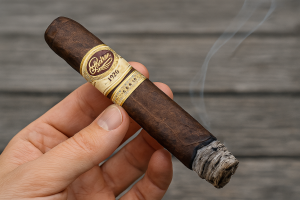How Long Are Wrapped Cigars Good For: Average Lifespan

Welcome, fellow cigar enthusiasts! In the world of luxury indulgence, a fine cigar undoubtedly takes center stage. The intricate process of crafting, aging, and preserving these exquisite cigars forms an integral part of the enthusiasts' journey.
Today, we delve into the fascinating world of wrapped cigars and answer one of the most elusive questions: How long are wrapped cigars good for?
Check the breakdown of the article below:
- Determining the Optimal Shelf Life of Wrapped Cigars
- The Aging Process and Its Effects on Cigars
- The Art of Proper Storage
- Conclusion
Optimal Shelf Life of Wrapped Cigars
While the aging potential of a cigar can vary, general guidelines can provide a starting point to assess its shelf life. Mild to medium cigars typically benefit from aging periods ranging from six months to two years. This range allows the flavors to mature and harmonize, resulting in a more refined smoking experience.
Full-bodied cigars tend to require a longer aging period, often falling between two to five years. The extended aging helps mellow and integrate the robust flavors, giving them a smoother profile. For vintage and limited-edition cigars, their potential for aging surpasses the five-year mark, with some enthusiasts seeking cigars that have aged for decades.
It is important to note that these timeframes are not definitive rules but rather suggestions based on experience and preferences. Each individual cigar may have unique aging requirements, and personal experimentation is key to finding what suits your taste best. Some cigars might reach their peak much earlier, while others may continue to evolve and improve over time.
The Aging Process and Its Effects on Cigars
Aging cigars is a critical step in the production process and plays a significant role in enhancing their overall quality. Several factors can influence the aging potential of wrapped cigars. The purpose of aging is threefold: to enhance flavors, stabilize fermentation, and mellow the harsh notes of young, unaged cigars.
Aged cigars undergo chemical reactions that intensify and harmonize flavors, creating a more complex and enjoyable smoking experience. Aging also helps stabilize the fermentation process by balancing the moisture content of the tobacco, preventing over-fermentation or excessive drying.
Furthermore, the aging process softens the rough edges of young cigars, mellowing any harsh flavors that may be present.
When it comes to determining the optimal shelf life of wrapped cigars, several factors need to be considered. The initial quality of the cigar, recommended aging requirements, and personal preference all play a crucial role. Observing and exploring personal tastes can help find the sweet spot between aging and enjoying cigars at their prime.
The Art of Proper Storage
Proper storage is crucial to maintain the integrity and aging potential of wrapped cigars. Implementing the following storage techniques will impact how good your cigars are good for in a very positive way.:
First and foremost, temperature control is essential. Extreme heat can dry out the tobacco and negatively impact the overall flavor, while extreme cold can cause the tobacco to contract and affect its combustion properties. Storing cigars at a consistent temperature, ideally between 65-70°F (18-21°C), is recommended.
Humidity management is equally vital. Cigars should be stored at a humidity level of around 65-72%. Too much moisture can promote mold growth, while excessive dryness can cause the cigars to become brittle and unpleasant to smoke. Utilizing a humidor or other humidity-controlled devices can help maintain the proper moisture levels needed for aging.
Furthermore, cigars should be stored in a place isolated from external elements. Light, odors, and excessive air movement can all affect the cigars' flavor and overall quality. Keeping the cigars in a closed container, such as a humidor, protects them from these potential hazards.
In cases where cigars have become dry due to improper storage, rehumidification methods can be employed to restore their moisture content. Gradual rehydration using a humidification device or a damp cloth can help revive the cigars, allowing them to be enjoyed as originally intended.
Conclusion
The journey of a wrapped cigar is an art form in its own right. Aging cigars enhances their flavors, resulting in a more delightful smoking experience. While guidelines from our team at Online Cigars can provide a starting point, personal taste and experimentation are crucial in determining the optimal shelf life of a wrapped cigar.
By understanding the art of aging and proper storage techniques, enthusiasts can elevate their enjoyment and appreciation for these magnificent creations. So, sit back, relax, and revel in the timeless craft of wrapped cigars, as each draw offers a stroke of artistic genius. Cheers to the perfect harmony of aged flavors!















